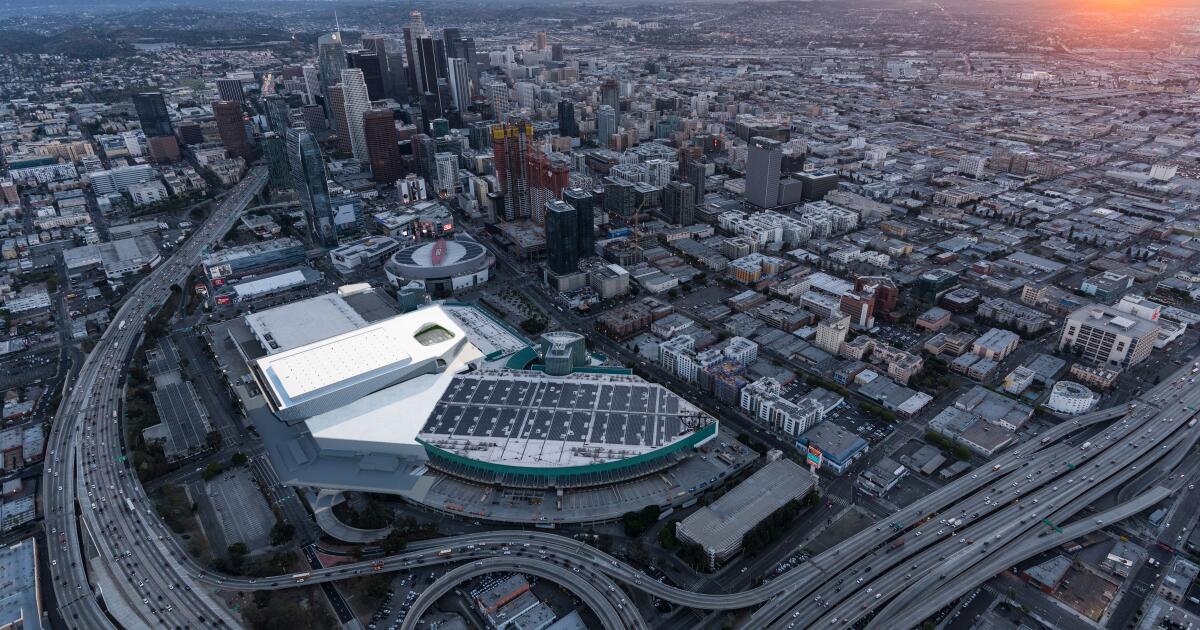On Tuesday, the City Council took a big step toward that overhaul, voting 13 to 1 to spend $54.4 million on pre-design work as part of a plan to expand the center before 2028, when Southern California hosts the Olympic Games.
The Convention Center doesn’t need to be bigger to host Olympic events such as table tennis and fencing. Still, city leaders want to use the international gathering as an impetus to start construction.
“It’s an investment that we need to make,” said Councilmember Traci Park, who chairs committees related to Olympic planning and tourism. “And if we can do it now, it’s something that we should do.”
The initial cost for the pre-design work could be as high as nearly $100 million, when the cost of borrowing is added, according to city analysts.
The expansion plan, if it proceeds from there, could cost $4.78 billion over 30 years, including debt on any loans. But if engineers conclude in the coming months that it can’t be completed in time for the Olympics or will go over budget, it won’t go forward, city analysts said Tuesday.
City leaders have long lamented the awkward configuration of the center, which consists of two structures, the South Hall and the West Hall. There isn’t enough contiguous space, hurting L.A.’s ability to attract top-tier conventions, according to city leaders.
The Wall Street Journal in 2023 ranked 30 of the largest convention centers in the U.S., scoring them on space, amenities, food options, proximity to airports and more. The Las Vegas Convention Center ranked No. 1, while Los Angeles ranked 21st.
The proposal approved by the council on Tuesday was reviewed by the city before the pandemic but stalled amid concerns about the coronavirus and whether people would attend conventions again.
The design now under consideration would add a new building on Pico Boulevard to connect the West Hall — which opened in 1971 and was originally named Yorty Hall after Mayor Sam Yorty — with the South Hall, which was added in 1993.
The proposal is one of many designs put forward over the years to remake the center. In 2012, city leaders backed a plan to demolish the West Hall to make way for a $1.2-billion football stadium, but developer Anschutz Entertainment Group failed to attract an NFL team.
Backers of the current proposal, including Councilmember Curren Price, whose downtown and South L.A. district includes the convention center, said Tuesday that the revamped site would boost local business and attract conventions.
“Not only will L.A. have a world-class Convention Center that we can be proud of just in time for the world stage, but also it’s going to bring together thousands of jobs,” Price said.
Some council members at Tuesday’s meeting expressed concern about spending money at a time when the city is slashing vacant positions to balance the budget. Others worried about the timeline for completing the project.
Under the plan, the city would pay for the construction of the center, but the work would be carried out through a private-public partnership with Anschutz Entertainment Group, which runs the convention center, and development firm Plenary Group.
AEG’s ticketing arm is one of the companies handling sales for the Olympic Games.
The reworked facility would bring in new revenue, including additional parking and money from digital signs, according to a city report. When those revenue streams are factored in, the cost to the city would decrease to about $43 million a year, according to the report.
Many business and labor leaders support the project, arguing that it would create jobs and revitalize downtown. The downtown business group Central City Assn. played a major role in pushing forward this latest version of the plan.
The 2028 Olympics were billed by supporters as a fiscally responsible event because no major venues need to be built. However, experts warn that cities routinely spend public money on local improvements before the Games.
“I have seen this dynamic time and again where Olympic organizers say they don’t need upgrades to a new venue, but they’ll sure take advantage of the opportunity when it presents itself,” said Jules Boykoff, a professor of politics and government at Pacific University in Oregon and the author of several books on the Olympics.
At the same time, construction companies may have leverage over the city because of the hard 2028 deadline, Boykoff said.
Councilmember Monica Rodriguez, who represents the northeastern San Fernando Valley, was the lone vote against spending the funds.
She expressed frustration that city analysts didn’t reveal that this project was in the wings when the council was briefed during budget hearings that started in April. City leaders have warned that city services will be stagnant in the coming year because of a lack of money.
“It’s not about whether or not we support the Convention Center. That isn’t the point. Yes, we do, myself included,” Rodriguez said. “The problem is, there’s been a horsing around with this — with this information coming.”
Councilmember Eunisses Hernandez, who represents several eastside neighborhoods near downtown, said at Tuesday’s meeting that her mother has worked at the Convention Center for more than two decades. She expressed concerned about the cost of the expanded center, even as she voted to move the plan forward.
“I do think we need to expand and invest in the Convention Center,” she said. “It just can’t come at the cost of us having to cut from other places.”
